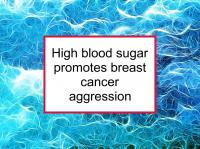Metformin, a drug used to treat type 2 diabetes, reduces the production of glucose in the liver, enhances the uptake of glucose in muscles, and lowers the level of glucose in the blood. Metformin also acts by increasing insulin sensitivity and reducing excess circulating insulin caused by insulin resistance.
However, a new study has reported that failure to maintain good glucose control may promote more aggressive breast cancer and reduce metformin efficacy.
Latest research: High glucose could reduce metformin's benefits
The study referenced at the beginning of this news story was designed to investigate the effects of metformin under overfeeding conditions in a rodent model of breast cancer. The authors previously demonstrated that overfeeding obese rodents (in whom mammary tumors had been induced using a carcinogen) resulted in a 50% increase in tumor glucose uptake, increased cell proliferation, and conversion of tumor cells into a more aggressive state. Metformin was found to inhibit these tumor promoting effects significantly. These results led the authors to hypothesize that a dynamic relationship exists between sustained energy excess (overfeeding) and metformin efficacy.
In the present study, excess glucose was found to be associated with significant increases in breast cancer cell proliferation, movement, and cancer promoting signaling, in addition to a reduction in apoptosis (programmed cell death). These effects were most evident in triple negative breast cancer cells. The anti-cancer effects of metformin were found to be greatly reduced in breast cancer cells cultured under high-glucose conditions. For example, metformin reduced IGF-1 expression in both HER2-positive (HER2+) SK-BR-3 and triple negative MDA-MB-468 cell lines less under high glucose conditions. In addition, significant favorable changes in cancer-related gene profiles induces by metformin under normal conditions occurred far less significantly under high-glucose conditions. The authors conclude that failure to maintain glucose control may promote a more aggressive breast cancer subtype and reduce metformin efficacy.
Please see our article on type 2 diabetes for more information.
